In 2024, Amrita Vishwa Vidyapeetham strengthened education for the Sustainable Development Goals (SDGs) beyond its enrolled students by delivering structured learning, training, and capacity-building programmes for alumni, local communities, professionals, educators, youth groups, and displaced populations. These initiatives are designed to build SDG literacy, applied sustainability skills, and community capacity through participatory, evidence-based educational models.
Amrita’s approach ensures that community engagement activities function as learning platforms that enable individuals and groups to understand, apply, and sustain SDG principles in real-world contexts.
Alumni Engagement for SDG Learning (India and International)
In 2024, Amrita strengthened SDG education through its global alumni network spanning 48 countries. Alumni engagement sessions conducted in India and during the Chancellor’s U.S. tour were structured as learning and dialogue platforms where alumni were introduced to Amrita’s SDG frameworks, sustainability priorities, and applied development models. These sessions enabled alumni to develop knowledge and competencies for mentoring, advocacy, and SDG-aligned community action in their respective regions.
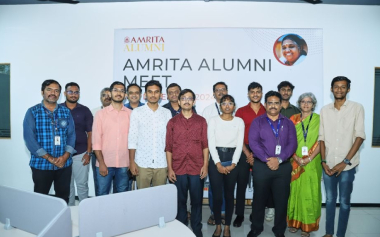
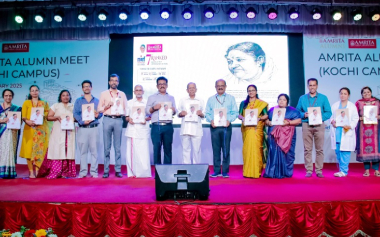
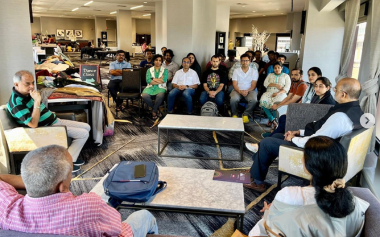
Through collaborations with AYUDH, alumni participated in community-based learning and applied sustainability initiatives, extending SDG education into professional and civic spaces beyond the university.
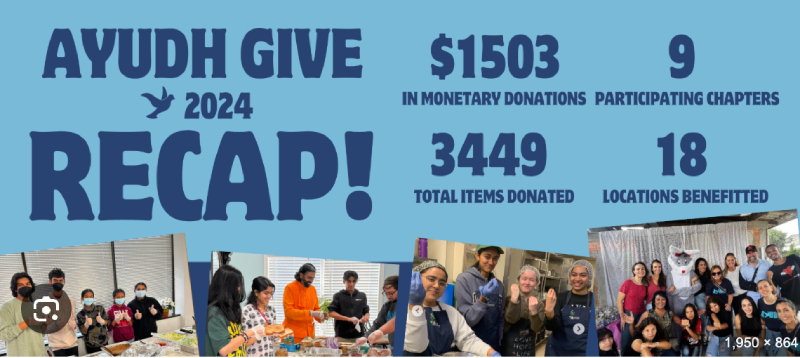
Community-Engaged SDG Education and Capacity Building
1. Live-in-Labs®: Experiential SDG Education for Communities
Live-in-Labs® is Amrita’s flagship community-engaged education model that integrates SDG education, participatory research, and capacity building in rural communities. Faculty and students work alongside local residents to co-design and implement SDG-aligned solutions addressing water, sanitation, energy, nutrition, health, digital inclusion, climate resilience, and livelihoods.
The programme emphasises two-way learning, where communities acquire practical knowledge, skills, and technologies, while learners gain experiential understanding of sustainable development challenges. Community workshops, training modules, and technology-transfer sessions ensure sustained learning outcomes beyond project duration, advancing multiple SDGs including SDG 1, 3, 4, 6, 7, 11, and 17.
2. Water, Sanitation, and Environmental Education
In 2024, Amrita utilised its campus infrastructure as a living laboratory for community education, delivering hands-on training on water conservation, wastewater reuse, pollution prevention, and groundwater protection. Structured workshops and demonstration sessions enabled community members, schools, and local organisations to develop applied competencies in sustainable water management, contributing to SDG 6 and SDG 12.
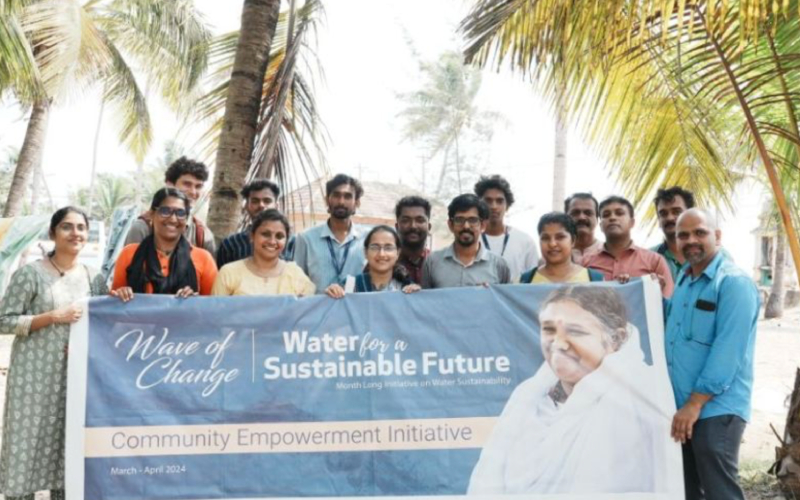
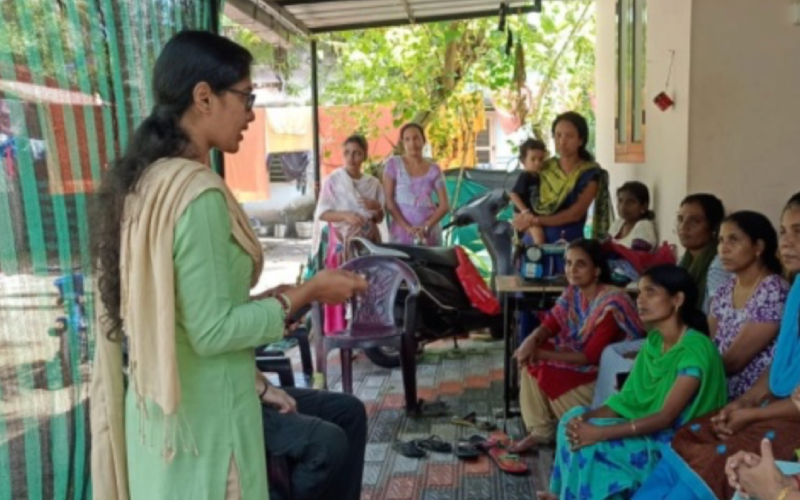
Health Outreach and Antimicrobial Resistance Education
Amrita delivered SDG-aligned health education programmes in India and internationally, integrating clinical outreach with structured learning on public health, hygiene, and antimicrobial resistance (AMR). Through the ALARM 2024 initiative, interactive educational technologies were used to teach schoolchildren and families about antibiotic stewardship and infection prevention.
These programmes strengthened community health literacy, supported SDG 3, and empowered participants to adopt evidence-based health practices for long-term wellbeing.
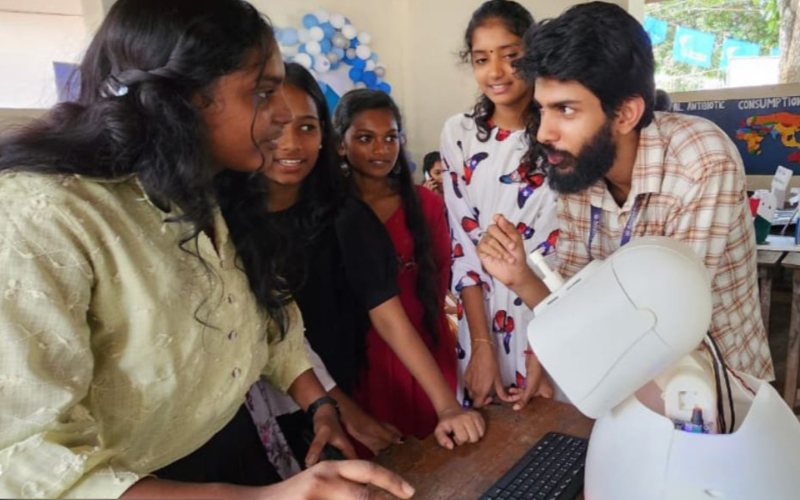
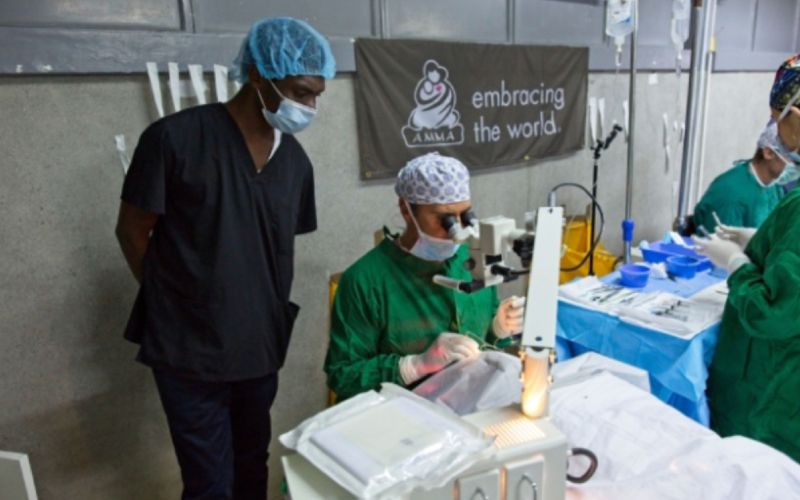
Community Education on Disaster Preparedness and Risk Reduction
Amrita expanded disaster-risk education through structured training, simulations, and workshops conducted in partnership with national agencies. The International Conference on Tsunami Risk Reduction and Community Resilience served as a knowledge-sharing platform that translated scientific research into accessible learning tools for coastal communities and local leaders.
Field-based learning and community dialogues enhanced understanding of early-warning systems, preparedness planning, and resilience strategies, supporting SDG 11 and SDG 13.
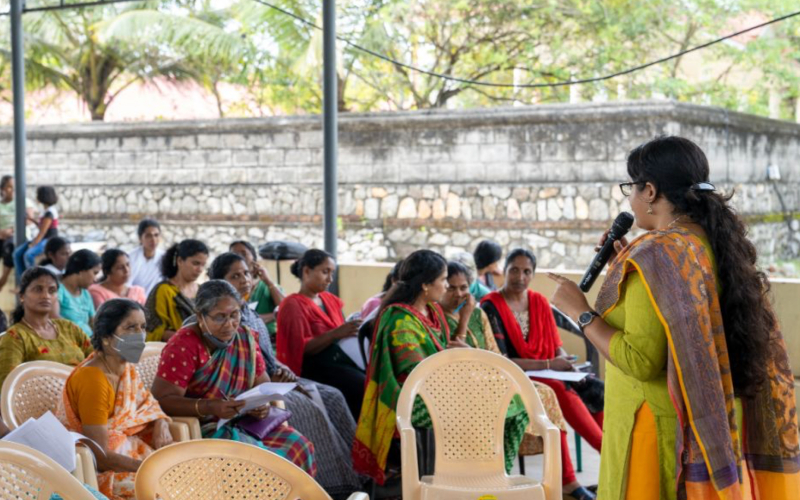
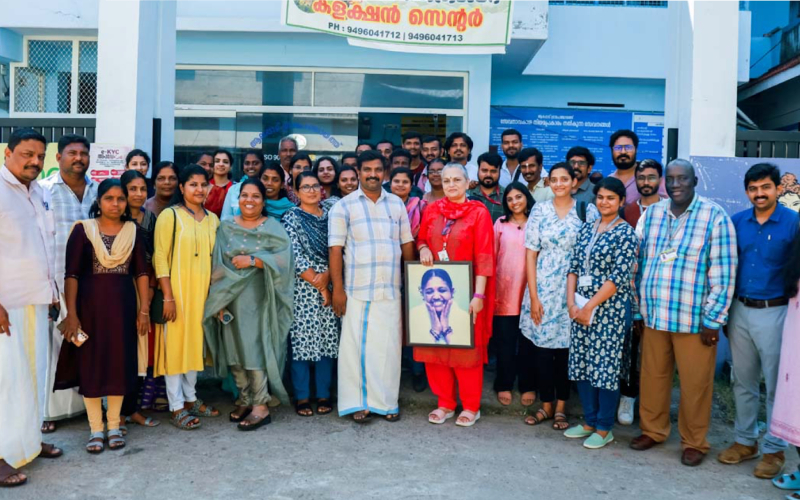
As an ATL Sarthi nodal agency, Amrita supported 67 schools through teacher training programmes, mentoring, STEM workshops, and innovation challenges designed to embed SDG concepts into school education. Educators were trained to integrate sustainability, design thinking, and problem-solving approaches into classroom instruction, strengthening SDG 4 and SDG 9 and expanding SDG education among young learners.
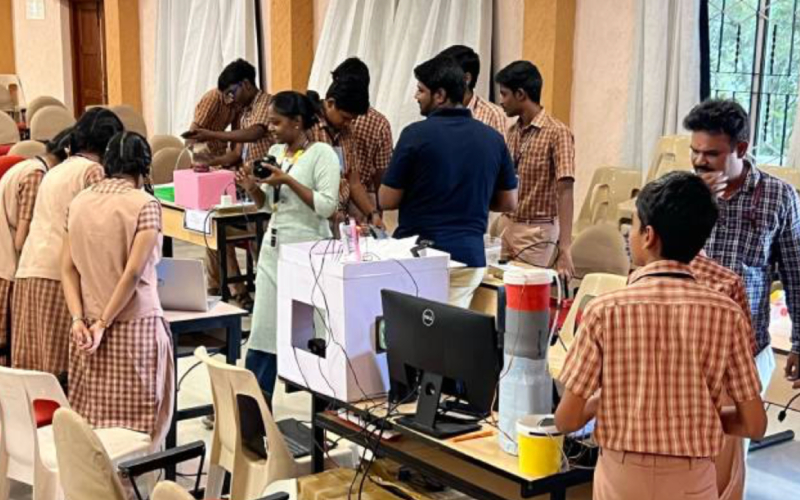
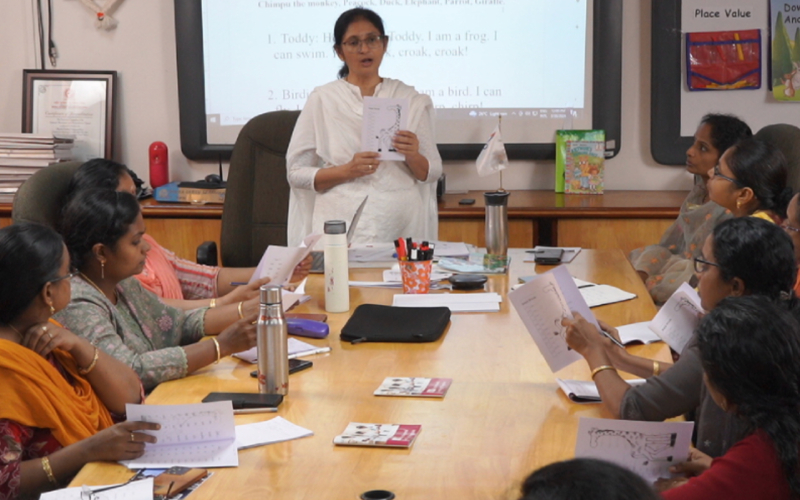
Amrita conducted climate-focused learning dialogues and capacity-building workshops with NGOs, educators, youth, and local officials. These programmes addressed climate finance, gender-responsive climate action, biodiversity conservation, and climate-resilient livelihoods, enabling participants to apply SDG 13 principles in local planning and decision-making.
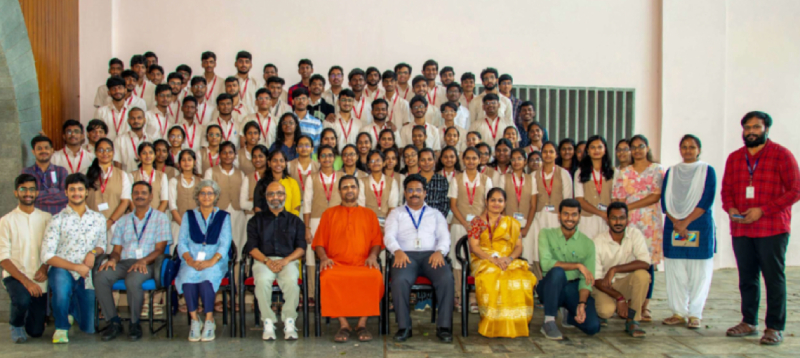
In 2024, Amrita developed a Certificate Course on Building Disaster Resilience and Social Responsibility under the UNESCO Chair, scheduled for rollout in 2025. The programme is designed to educate teachers, NGO practitioners, youth leaders, and local officials, creating a cadre of trained community resilience educators and practitioners who can disseminate SDG-aligned knowledge at scale.
Learning-Centred Engagement with Displaced Populations
Following the 2024 Wayanad landslides, Amrita delivered education-centred community engagement in relief camps, including psychosocial learning sessions, hygiene education, child-focused learning support, and resilience-building workshops. These initiatives prioritised learning continuity and community capacity, supporting recovery and long-term resilience.
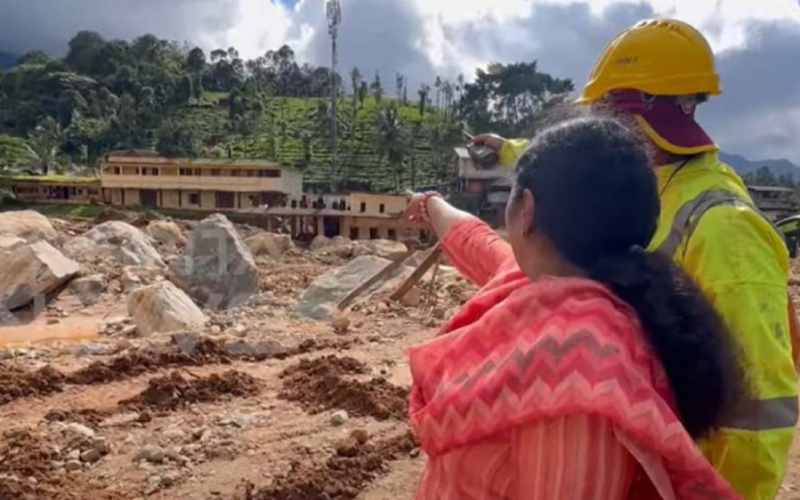
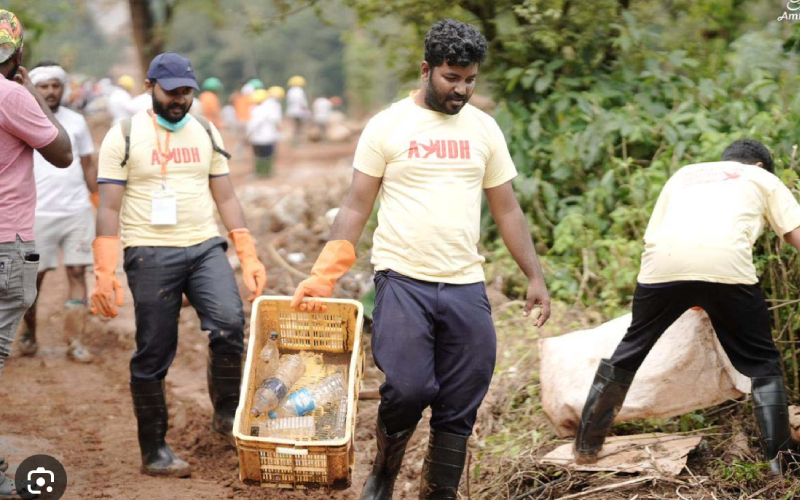
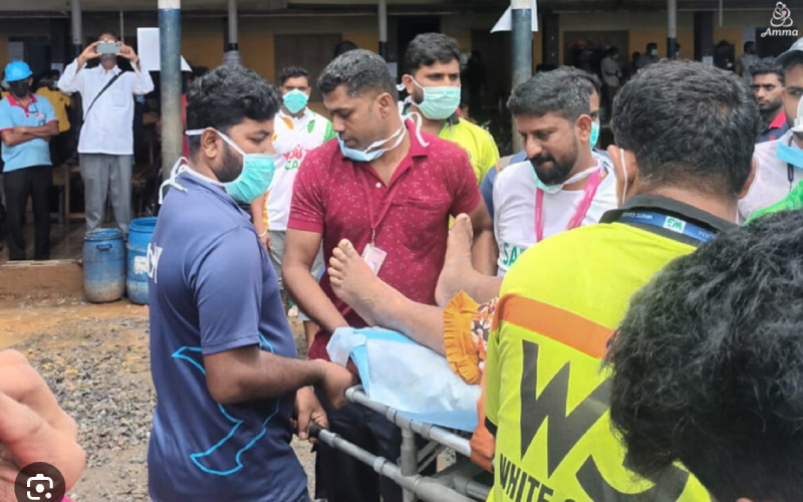
In 2024, Amrita Vishwa Vidyapeetham convened the International Conference on Tsunami Risk Reduction and Community Resilience as an education and knowledge-sharing platform marking 20 years since the 2004 Indian Ocean Tsunami. The programme emphasised education for displaced coastal communities, translating two decades of research and lived experience into practical learning resources and resilience-building strategies to address long-term challenges such as displacement, livelihood loss, coastal erosion, and resettlement. Field-based community engagements enabled mutual learning and strengthened SDG 11 (Sustainable Cities and Communities) and SDG 13 (Climate Action) through applied disaster-risk education.
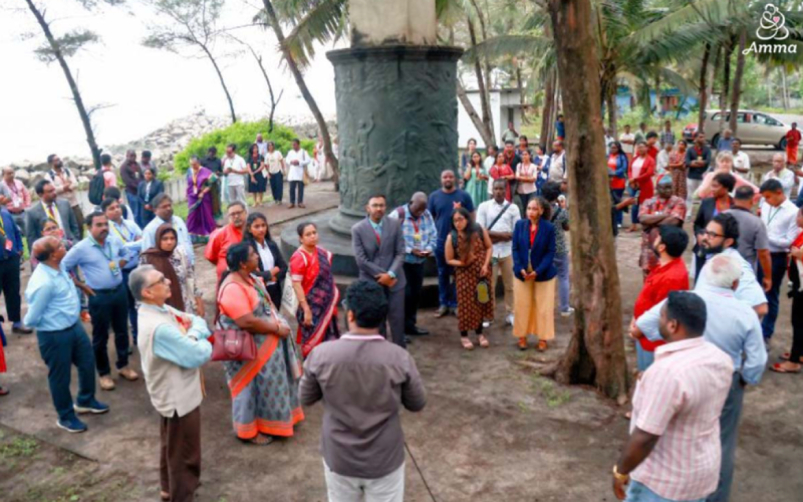
During the International Tsunami Conference, Amrita facilitated educational field engagements with vulnerable coastal communities, integrating community knowledge into academic discourse and strengthening inclusive approaches to disaster-risk education.
Last Update : December 1, 2024



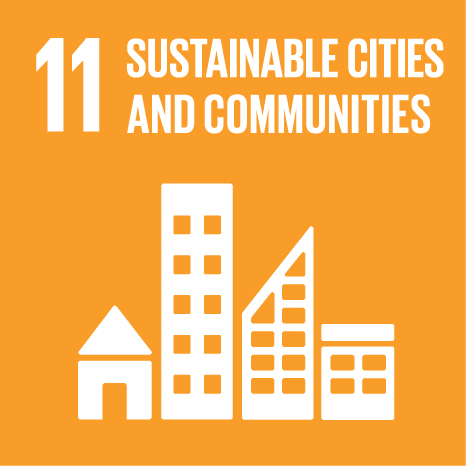
Introduction: Education as a Transformative Tool for Communities
Amrita Vishwa Vidyapeetham has established comprehensive educational outreach activities designed to extend the transformative power of education far beyond the university campus to serve diverse segments of society including alumni, local residents, marginalized communities, and displaced populations. Rooted in the institution’s founding principle that education should serve as a tool for social transformation and compassionate development, these outreach programs represent a systematic commitment to democratizing access to quality education and skill development for those facing economic, geographic, and social barriers to educational opportunity.
In 2023 and continuing through 2024, Amrita significantly expanded its outreach programs to positively impact alumni, local residents, and marginalized communities, including displaced populations, through dedicated educational initiatives aligned with the Sustainable Development Goals. These programs reflect the conviction that universities have a responsibility not only to educate their enrolled students but also to serve as anchors of educational opportunity and community empowerment within the regions they inhabit.
Alumni Engagement and Educational Participation
Alumni SDG Workshop and Learning Programs
Amrita has launched structured workshops specifically designed to engage alumni in deepening their understanding of the university’s Sustainable Development Goals initiatives and creating pathways for alumni contributions to sustainable development. These workshops provide alumni with detailed insights into Amrita’s specific SDG initiatives, ranging from sustainable innovation and environmental conservation to community-focused projects aimed at uplifting rural communities across India.
During these alumni education sessions, university leadership including Dr. Maneesha V Ramesh, Provost of Amrita, showcases compelling success stories of SDG-driven projects and outlines practical steps alumni can take to contribute actively to Amrita’s mission of sustainable development and education. The workshops are structured to help alumni leverage their professional skills, business networks, social capital, and financial resources to support community-focused initiatives. Alumni expressed substantial enthusiasm to participate, collectively identifying numerous ways to contribute their expertise—whether through direct project involvement, mentoring, financial support, or sector-specific collaboration.
Amrita Alumni Mentoring Program
Amrita has established a comprehensive Alumni Mentoring Program designed to build meaningful connections between current students and graduates and the broader global network of Amrita alumni. This multi-industry mentoring program offers current Amrita students the opportunity to receive professional mentorship from skilled alumni who are active in their chosen subject of interest or closely related career domains. The program’s objective is to accelerate the professional development of students and recent graduates by enabling them to build informed professional insights and achieve their career goals through direct engagement with experienced professionals.
The program operates through two complementary formats: short-term mentoring focused on specific skill development or career questions, and extended mentoring through which qualified students and recent graduates work with experienced alumni or faculty members who share their interests and career ambitions over an extended period, typically spanning a student’s final semester or the first year following graduation. Alumni volunteers from all Amrita campuses—including industry professionals, entrepreneurs, academicians, and creative professionals—participate in the mentoring program, creating opportunities for students to learn from diverse professional pathways and experiences.
Global Alumni Network and Community Service
Amrita maintains an active global alumni network spanning 48 countries, with alumni organized into local and virtual interest groups that provide forums for professional advancement, social connection, and community service. The alumni network explicitly connects alumni volunteers with community service opportunities through which they can apply their skills and networks to advance Amrita’s sustainable development mission. Alumni are encouraged to band together to provide tangible support to rural development projects, environmental initiatives, and educational programs reaching underserved communities. This network ensures that Amrita’s educational impact extends continuously through alumni engagement with communities long after students have completed their studies.
Overview and Scale of Impact
Amrita SeRVe (Self-Reliant Villages), launched in 2013 during Chancellor Amma’s 60th birthday celebrations, represents the university’s flagship community development program dedicated to empowering impoverished villages across India through sustainable development. The program now operates across more than 2,200 villages in 27 states, reaching hundreds of thousands of residents with educational and developmental initiatives. Amrita SeRVe’s work is explicitly aligned with the United Nations Sustainable Development Goals and focuses on seven foundational areas that progress from addressing basic needs to enabling complete community independence and self-reliance.
Amrita SeRVe employs a combined effort of Amrita University’s research centers and community volunteers, with solutions co-developed with community members to ensure cultural appropriateness and long-term sustainability. This approach positions villagers not as passive recipients of development interventions but as active agents of their own transformation.
Education and Literacy Programs in Amrita SeRVe Villages
Within the 2,200+ Amrita SeRVe villages, education emerges as a critical pillar of community development and empowerment. The program operates comprehensive after-school tutoring programs utilizing tablet technology to provide immersive, technology-enhanced learning experiences for children in remote villages where access to quality education remains severely limited. The programs specifically prioritize ensuring that girls continue their studies rather than being withdrawn to work in agricultural fields or household labor—a common practice in many rural communities.
The education component of Amrita SeRVe also extends to adult literacy training, with particular emphasis on women’s literacy. Teachers trained by Amrita’s education programs conduct classroom instruction and community engagement sessions that build reading, writing, and numeracy skills among adult community members, expanding educational opportunity across all ages. These literacy programs recognize that educational development requires engagement across generations, as parents and guardians’ educational attainment significantly influences children’s educational aspirations and opportunities.
The village education workers trained through Amrita SeRVe also support drop-out students, working directly with families to encourage discontinued students to return to school and complete their education. These interventions address the reality that in rural India, many children—particularly girls—discontinue formal schooling due to economic pressure, cultural norms, or lack of perceived educational relevance. Amrita’s community educators work to rebuild educational engagement and aspiration among these vulnerable populations.
Community Health and Wellness Education
Beyond literacy and academic education, Amrita SeRVe delivers comprehensive health education reaching 101 villages where regular medical clinics operate with trained health workers. These health workers conduct regular awareness sessions addressing critical health topics including nutrition and malnutrition prevention, communicable disease control, tobacco awareness, and sanitation and hygiene promotion. The educational approach emphasizes prevention and community empowerment rather than solely treating illness after it occurs.
In villages across Amrita SeRVe’s network, the university’s sanitation and hygiene awareness sessions, especially with children, have contributed to India’s government officially declaring 12 Amrita SeRVe villages as “Open Defecation Free.” This public health milestone reflects the integration of education, infrastructure development, and community mobilization around health and dignity.
The programs have also addressed malnutrition through integrated agricultural and nutritional education. Amrita provides vegetable seeds and conducts home cultivation education, ensuring that educational interventions address the root causes of malnutrition rather than only treating its symptoms. This approach exemplifies how Amrita’s educational outreach extends across multiple domains—combining traditional academics with practical skills and health knowledge essential for human flourishing.
Skills Development for Displaced Communities in Wayanad
On December 13, 2024, Amrita inaugurated a Skill Development Training Center at Mata Amritanandamayi Math in Meppadi, Wayanad, specifically designed to support landslide-affected and displaced communities of this disaster-prone region. This initiative exemplifies Amrita’s educational commitment to populations facing extraordinary vulnerability due to climate and natural hazards. The program equips affected community members with sustainable livelihood skills, creating new opportunities for self-reliance and economic resilience for families displaced by environmental disasters.
The Meppadi training center’s inaugural phase provides training to 60 participants in tailoring skills and 30 participants in computer skills including MS Office and Tally—competencies identified as having high demand in contemporary job markets. This training program goes beyond merely providing tools; it offers comprehensive instruction in how to use those tools effectively, ensuring that participants build lasting skills enabling them to sustain themselves and their families. The program prioritizes women and youth from displaced communities, recognizing their particular vulnerability and their central role in family and community resilience.
The training center operates in close collaboration with local government authorities including the District Panchayat President and Gram Panchayat (village council) leadership, ensuring alignment with local development priorities and integration of community members into local governance processes. This collaborative approach ensures that educational and skill development interventions support broader community empowerment and democratic.
About AMMACHI Labs
AMMACHI Labs is an academic and research center at Amrita Vishwa Vidyapeetham that brings an interdisciplinary approach to addressing societal challenges through innovative educational tools and skill development solutions. Committed to uplifting rural villages of India—the communities standing to benefit most from skill development—AMMACHI Labs develops community-focused outreach solutions alongside focused research and development in emerging technologies including Computer-Human Interaction (CHI), robotics, automation, haptic technologies, and applied robotics.
Training of Trainers Programs
AMMACHI Labs implements comprehensive Training of Trainers (ToT) programs that equip community leaders, educators, health workers, and development practitioners with the knowledge and skills to deliver quality training and educational services within their communities. These programs operate on a multiplier model, ensuring that training capacity is built within communities rather than remaining dependent on external experts.
A notable example occurred in July 2024, when a five-day Training of Trainers program concluded successfully in Sarai Village, Uttar Pradesh, as part of Amrita Vishwa Vidyapeetham’s community educational outreach initiatives. The program featured Haksh-E, a robotic companion that teaches hand hygiene through interactive demonstrations, making health education engaging and memorable for children. This innovative approach demonstrates how emerging technologies can enhance educational effectiveness in rural contexts, transforming abstract health concepts into concrete, interactive learning experiences that capture children’s attention and facilitate behavior change.
Technology Skills Development Workshops
AMMACHI Labs, in collaboration with Amrita Vidyalayams (Amrita-affiliated schools), conducts technology skills workshops reaching diverse student populations across Tamil Nadu and other states. Recent initiatives included eight workshops conducted across multiple Amrita Vidyalayam campuses, during which 324 students actively participated, including 144 young women. These sessions covered cutting-edge fields including Game Development, Artificial Intelligence, Internet of Things, Virtual Circuit Design, and 3D Modeling, equipping students with foundational competencies in emerging technology domains essential for contemporary employment and innovation.
The workshops specifically prioritize women’s participation and skill development, recognizing the persistent gender gaps in technology fields and the importance of building women’s confidence and competency in STEM (Science, Technology, Engineering, Mathematics) domains from early stages of formal education.
Seaweed Cultivation Training for Women’s Empowerment
Recognizing the importance of integrating educational initiatives with sustainable livelihood opportunities, AMMACHI Labs launched the Seaweed Cultivation Training Project in January 2023 to empower women and women’s groups through integrated vocational training. This project demonstrates how Amrita’s outreach programs connect skills education with market opportunities and environmental sustainability, enabling women to simultaneously build livelihoods and contribute to coastal ecosystem health.
Comprehensive Health Awareness and Medical Camps
Amrita demonstrates a comprehensive commitment to delivering health and well-being outreach programs in local communities, aligned with Sustainable Development Goal 3 (Good Health and Well-Being), SDG 5 (Gender Equality), and SDG 17 (Partnerships for the Goals). These programs engage students, faculty, and healthcare professionals in volunteer-led initiatives addressing critical health and wellness topics including hygiene promotion, nutrition education, family planning awareness, sports and exercise programs, and aging well initiatives.
In June 2024, Amrita’s Ayurveda team conducted a lifestyle survey and free medical camp in Serchhip, Mizoram, where they touched the lives of 150 participants. Sixty-six individuals participated in comprehensive lifestyle assessments including evaluation of diet, physical activity, smoking and alcohol consumption, stress levels, and general health awareness. Eighty-four participants received health checkups and 475 free medicines were distributed for common ailments. The program provided not only immediate healthcare but also educational assessment of lifestyle factors enabling participants to understand how daily choices impact long-term health.
Knowledge to Action Initiative
The “Knowledge to Action” initiative ripples across Amrita SeRVe villages throughout India including regions of Uttarakhand, Himachal Pradesh, Haryana, and Punjab. Health education sessions conducted by trained community health workers reach villagers with evidence-based messages on nutrition, malnutrition prevention, malaria control, and tobacco awareness—equipping community members with knowledge to safeguard their own health and that of their families.
Super Specialty Medical Camps
Amrita Hospital conducts Super Specialty Medical Camps bringing advanced healthcare expertise to remote communities. One such camp in the Marayoor region, beginning January 5, 2024, operated over three intensive days, providing care to 746 patients from remote tribal communities across multiple specialties including cardiology, general medicine, surgery, pediatrics, gynecology, ophthalmology, and dermatology. Beyond treating immediate health concerns, the camps conducted tribal nutrition assessments and distributed free diagnostic tests and medicines, demonstrating Amrita’s holistic approach to community wellness that addresses health from multiple angles simultaneously.
Wave of Change: Water for a Sustainable Future
On World Water Day 2024, Amrita School for Sustainable Futures launched “Wave of Change: Water for a Sustainable Future,” a comprehensive initiative to empower communities to become proactive stewards of their water resources. The program operates on the recognition that water security depends not only on infrastructure but on communities’ knowledge, commitment, and practices regarding water conservation and management.
The initiative was launched in Kallikkadu, Alapuzha, Kerala, with participation of local government representatives including the Vice President of Alappuzha Municipality and Ward Members, alongside faculty and PhD scholars from Amrita’s School for Sustainable Futures. The program reached approximately 150 women residents who actively participated in comprehensive educational sessions addressing water conservation, rainwater harvesting, and water resource reuse. Expert instructors conducted interactive sessions teaching participants how to conserve water sources, effectively utilize rainwater and waterways, and monitor daily household water consumption as part of comprehensive water awareness.
Water Champions Training Program
A key innovation within Wave of Change is the identification and training of “water champions” within communities. Through assessments conducted by water experts from Amrita University, individuals with passion for water sustainability are identified and equipped with knowledge and skills to lead their communities toward more sustainable water futures. These water champions serve as ambassadors for change within their communities, through training and engagement efforts empowering fellow community members to adopt water-wise practices, ensuring the long-term sustainability of water resources.
Amrita plans to conduct similar awareness sessions, training programs, and certification programs across 108 communities in India, systematically building water literacy and agency across diverse populations. The program demonstrates how localized educational initiatives can catalyze broader environmental behavior change through community-based leadership development.
National Workshops on Water Sustainability Education
Recognizing that education for sustainable development must extend beyond direct community education to reach educators, Amrita conducted national workshops on water sustainability education reaching 500 participants from 15 states across India. These workshops provided specialized training for school and college teachers on incorporating water sustainability into their curricula, enabling educators to extend water education to thousands of students within their classrooms. Workshops included practical water audit projects and training in development of conservation models and awareness campaigns that educators could implement within their schools.
Amrita developed and distributed a comprehensive “Water Sustainability Toolkit” containing educational materials, guidelines for implementing water conservation projects, and resources for measuring the impact of sustainability initiatives. This toolkit approach ensures that educators have practical resources for translating sustainability concepts into classroom practice.
Atal Tinkering Labs (ATL) Sarthi Program
Amrita Vishwa Vidyapeetham was selected as the nodal agency for implementation of the Atal Innovation Mission (AIM) NITI Aayog’s Atal Tinkering Labs (ATL) Sarthi cluster program for Coimbatore district in August 2024. Through this government program, Amrita’s Institution Innovation Council (IIC) and Office of Students’ Affairs (OSA) organize comprehensive outreach activities benefiting 67 schools with ATLs in Coimbatore district.
The program includes hackathons, project exhibitions, cybersecurity awareness programs, workshops, teacher training programs, guidance for compliance, and school visits. This coordinated approach ensures that schools implementing ATL initiatives receive ongoing support and that educational quality is maintained across the networked schools. Schools mentored and visited include Yuvabharathi, Evangeline, Dr. PGV, Rathinam International Public School, and numerous other institutions across the district.
Notably, AIM’s ATL Sarthi initiative aims to provide a self-sustainable cluster model for enablement and monitoring of 10,000 ATLs established at schools in 700+ districts throughout India, demonstrating how universities can scale their educational impact through coordinated partnerships with schools and government agencies.
Pradhan Mantri Kaushal Vikas Yojana (PMKVY) Program
Amrita Vishwa Vidyapeetham serves as an implementing agency for the Government of India’s Pradhan Mantri Kaushal Vikas Yojana (PMKVY) Special Project initiative, operating skill-training centers across five states: Kerala, Odisha, Chhattisgarh, Tamil Nadu, and Jharkhand. The PMKVY Special Project initiative is designed to ensure that youth from remote and rural areas receive access to quality skill development training leading to employment opportunities.
Amrita PMKVY Centers follow a “Hub and Spoke Deployment Model” to train, certify, place, and empower working-age youth aged 18-35 who struggle to access viable economic opportunities. The hub of each district manages nearby spokes, ensuring coordinated quality and resource management. This program addresses a critical gap in rural youth employment, providing training in industry-relevant skills that lead to stable employment, business creation, or advancement in existing employment.
Students Outreach Program
Amrita conducts dedicated outreach programs targeting secondary school students, bringing them to campus to experience university life while providing career guidance and inspiration. During a recent Students Outreach Program held at Amrita Chennai Campus from November 19-21, 2024, 92 enthusiastic students from Amrita Vidyalam Senior Secondary School participated in a comprehensive three-day experience. The program included sessions on career pathways after secondary education, delivered by expert faculty guiding students on informed career decision-making, hands-on robotics and drone workshops fostering innovation and engineering thinking, and campus tours enabling students to experience the university’s research environment and cutting-edge facilities.
Such outreach programs demystify higher education, expose secondary students to research and innovation opportunities, and encourage their pursuit of challenging academic pathways, particularly reaching students from less-privileged backgrounds who may lack such exposure within their home communities.
Access to Government Welfare and Entitlements
Beyond direct educational programming, Amrita’s community outreach addresses barriers that prevent marginalized populations from accessing their rights to government welfare programs, education, and social services. Through consistent outreach and hands-on support, Amrita’s community workers assist villagers in navigating bureaucratic processes and claiming government welfare benefits and entitlements. This educational and advocacy role recognizes that marginalized populations often lack information about and support in accessing the government programs designed to benefit them.
Programs specifically support displaced populations, including landslide-affected communities, through skill development training (as discussed in the Wayanad initiative), health education, and livelihood support—recognizing that natural disasters disproportionately impact the economically vulnerable and often exacerbate existing inequalities unless deliberate support systems exist.
Sadgamaya: Cultural Retreat and Educational Programming
Amrita hosts Sadgamaya, a residential cultural retreat program that convenes participants for intensive learning and cultural engagement. The 2025 Sadgamaya retreat was inaugurated by the Governor of Maharashtra and featured programming on the relevance of the Indian Knowledge System in contemporary academic contexts. The program brings together students, faculty, alumni, and community members for immersive educational and cultural experiences, fostering deeper understanding of India’s intellectual traditions and their application to contemporary challenges.
Demonstrating its commitment to making education accessible to impoverished populations globally, Amrita conducted an educational outreach program across Kenya, Uganda, and Tanzania from April 28 to May 3, 2024, as part of the Government of India’s Study in India initiative. The Amrita team, led by Ms. Sindhu Manoj and Mr. Tobias Nauruki, engaged with key government officials and educational institutions from these three countries to explore collaborative opportunities in higher education and sustainable development.
During their travels, the Amrita team interacted with more than 900 students spanning undergraduate, graduate, and postgraduate levels, conveying Chancellor Amma’s vision of making sustainable development and education accessible to all, including those from impoverished backgrounds in African countries. This outreach demonstrates that Amrita’s educational commitment extends beyond India to embrace educational and development partnerships across the Global South.
Amrita AHEAD Online Education Programs
Recognizing that geographic location should not limit access to quality higher education, Amrita offers comprehensive online degree programs through Amrita AHEAD (Amrita Higher Education for All Development). These programs enable students to pursue academic goals irrespective of their location, offering flexibility essential for working professionals, rural students, and individuals with other constraints to residential campus study. Amrita AHEAD programs extend beyond traditional academic knowledge to nurture leadership qualities and soft skills essential for professional success, ensuring that online learners receive comparable quality and developmental support as campus-based students.
Faculty and Community Educator Development
Recognizing that quality community education requires capable educators, Amrita has invested substantially in faculty development programs. AICTE-sponsored Faculty Development Programmes on “Green Technology and Sustainability Engineering” enhance educator capacity in critical sustainability areas, enabling faculty to bring cutting-edge sustainability knowledge to classroom teaching and community education programs.
Education as Community Transformation
Amrita Vishwa Vidyapeetham’s comprehensive portfolio of community outreach educational activities reflects a fundamental conviction that education is the most powerful tool for human and community transformation. Through alumni engagement programs that mobilize graduates as agents of development, through Amrita SeRVe reaching 2,200+ villages with literacy and livelihood education, through specialized skills development for disaster-affected populations, through health and environmental education initiatives, and through international outreach, Amrita has created a comprehensive ecosystem of educational opportunity extending far beyond its campuses.
These programs recognize that meaningful sustainable development requires educational engagement across the life span and across diverse segments of society. They demonstrate that universities can fulfill their responsibility to serve as community anchors and agents of transformation, using their intellectual, technical, and human resources to amplify educational opportunity for those most marginalized from formal education systems. By combining direct service with capacity building of local educators and community leaders, Amrita ensures that educational impact extends through multiplier effects, building sustainable systems of educational access and quality within communities rather than creating dependency on external expertise.
The scale of these efforts—reaching 2,200+ villages through Amrita SeRVe, 27 states through various programs, and international communities in Africa and beyond—testifies to the transformative vision animating Amrita’s educational commitment. Yet the deepest measure of impact lies not in numbers alone but in transformed lives, families, and communities where education has opened pathways to dignity, economic opportunity, health, environmental stewardship, and agency in shaping sustainable futures.